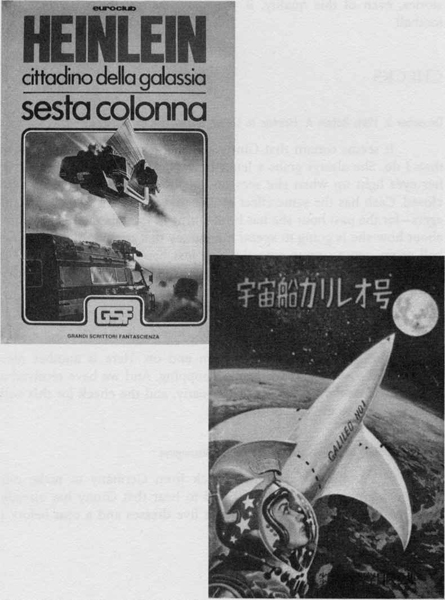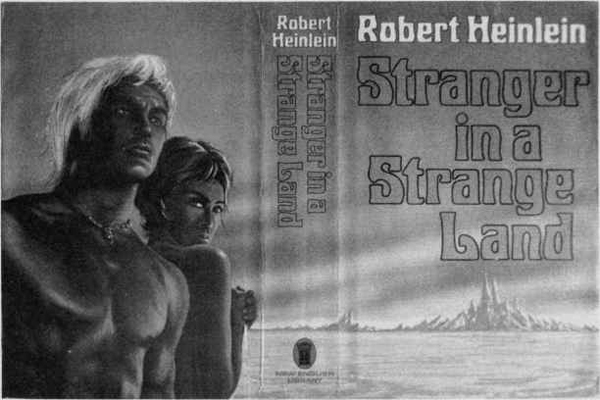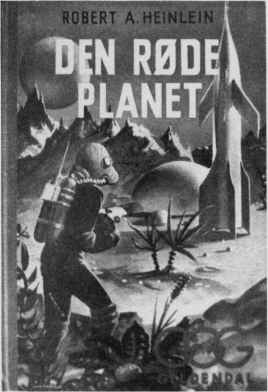Grumbles from the Grave (26 page)
Read Grumbles from the Grave Online
Authors: Robert A. Heinlein,Virginia Heinlein
Tags: #Authors; American - 20th century - Correspondence, #Correspondence, #Literary Collections, #Letters, #Heinlein; Robert A - Correspondence, #Science Fiction & Fantasy, #20th century, #Authors; American, #General, #Language Arts & Disciplines, #Science Fiction, #American, #Literary Criticism, #Science fiction - Authorship, #Biography & Autobiography, #Authorship

PUBLISHERS
July 5, 1963: Robert A. Heinlein to Lurton Blassingame
As to Scribner's and Doubleday, I intend to let each of them get away with it and not argue further. But my opinion has not changed. Each of them is deviating from the contract as written and in each case to my financial loss. They would not let me deviate from contract if it cost
them
sizable amounts of money. Doubleday talks as if the 50-50 split on pocketbook were a law of nature. Nuts and nonsense; it is merely an extortion that writers usually have to put up with. The entire history of the Authors' Guild and of divisible copyright is one of slowly getting rid of these grabs which publishers defend under the theory of "usual practice." If the "usual contract" did not contain these grabs, trade book publishers would have to work hard at selling the trade edition. Doubleday has never once done a decent job for me of selling the trade edition (take a look at your records)—no, not once. Instead they have signed a "sweetheart" contract with one of their own subsidiaries, printed a very cheap edition which they called a trade edition but which was in fact a book club edition—and the nominal royalty in the contract meant nothing; the extremely low royalty in the "sweetheart" contract was the one that counted. Then they had half of the NAL edition as well—except this one book and now they have grabbed that, too, without my consent. No, I do not like Doubleday. Okay, they get this few hundred dollars—but I will never sign another contract with them.
Scribner's is a different case; they have a real sales organization for selling the trade edition, they do sell it and make money on it, for themselves and for me—and I am sorry on that account that they ever dropped me. . . . But, nevertheless, their contract does not permit them to cut my royalty just because they choose to put out, under their own imprint, a softcover edition. Nor does it cut any ice with me that the percentage royalty is higher than it would be if they farmed it out to, say, NAL—because I am convinced that if they did farm it out to NAL, the dollar return would be much higher, even though the percentage was lower. I may be wrong and time will tell—but, so far, their venture into softcovers, at three times the price of an NAL softcover, seems to be going over like a lead balloon.
As may be—each of these publishers is rewriting a contract to suit himself and against my explicit objections . . . and I shall argue no further with them; life is too short. They can keep their grabs and be damned.
MAGAZINES
March 9, 1963: Robert A. Heinlein to Lurton Blassingame
I don't think
Fantasy and Science Fiction
is riding the edge; I think they are just stingy. They claim 56,000 paid circulation. In view of their rates and their cheap production, plus some revenue from France and Germany, they should be showing a clear profit each month.
Back in December ---- told me that the publisher would happily pay me in advance. As it is, they got a bargain—copy for $1,500 that they normally pay $1,800 for, to any writer, known name or not. Still, it is pleasanter than offering copy to John Campbell, having it bounced (he bounced both of my last two Hugo Award winners)—and then have to wade through ten pages of his arrogant insults, explaining to me why my story is no good.
April 15, 1963: Robert A. Heinlein to Lurton Blassingame
Re
Playboy
article: I have the material well worked out and am prepared to deliver it by 10 May.
But I shall not deliver it on the basis of a phone call. The last time I accepted a job from them based on a firm agreement by phone call there was a lot of nonsense afterwards about whether or not I was being paid for the work, or paid for an option, and I had to do two rewrite jobs.
. . . Just refer him to my letter of 2 April (of which you have a copy): "Just address a letter to me, or preferably to Mr. Blassingame, offering me a firm assignment for so many thousands of words for so many dollars on such and such a subject to be delivered by such and such a date—and with the explicit condition that the manuscript will be paid for whether used or not and that any rewriting lies outside the agreement and must be negotiated at an additional fee."
I meant every word. The assignment must be in writing and the clause about rewriting must be spelled out, and all the terms must be explicit—and a phone call means
nothing
!
Otherwise I will not bother to come in out of my garden. It's nice out there and I'm sick of this machine. I don't need the money; I've already worked too much this year and will have too high a tax—and I am especially aware of it on income tax day.
Apparently ----- thinks I'm a nice accommodating guy. Please explain to him that I am a son of a bitch.
DEFAULT
January 27, 1961: Robert A. Heinlein to Lurton Blassingame
Please tell ---- that I am a kindly old gentleman and that the "A." in the middle of my name stands for "Ebenezer Scrooge" and that I am buying a new freezer with my ill-gotten wealth to make room for him.
CHAPTER X
SALES AND REJECTIONS
November 24, 1947: Robert A. Heinlein to Lurton Blassingame
The last couple of rejection letters you have sent me are rather disturbing. Miss Helen Grey of
Town and Country
is mistaken in thinking that my sales to the SEP [
Saturday Evening Post
] have gone to my head. It is simply that an idea as good as "The Green Hills of Earth" doesn't come to me every week. I have been in a slump and am afraid that I am still in it. I continue to work and to work very hard indeed, but a lot of the stuff I turn out doesn't seem too good to me. Stuart Rose's rejection of "Broken Wings" is decidedly a disappointment, for I had believed that "Broken Wings" was up to standard. Still more disappointing is his statement "These space ship stories didn't do too well, according to our readership surveys." I interpret this as meaning that the
Saturday Evening Post
is no longer interested in my interplanetary stories unless they are utterly terrific, superior in every way to a story with a customary contemporary down-to-earth background . . .
I may turn out quite a number of second-rate stories before I recover completely from the effects of my domestic breakup. For the past several months I have been able to continue writing only by the exercise of grim self-discipline. It occurs to me that you might find it desirable to sell or attempt to sell stories written during this period to secondary markets under a pen name. What do you think? Would it be good business to protect my reputation, such as it is, by keeping my own name off material which in your opinion is not as good as my best? . . .
. . . From now on I must devote my time exclusively to preparing the second juvenile novel [
Space Cadet
] for Charles Scribner's Sons. I have been working on this boys' novel off and on for several months. I rather dread sitting down and turning out the first draft on it because I simply am not in the sanguine mood which should obtain in any book intended for the young. I could knock off half a dozen tragedies right now easier than I could write one cheerful story.
March 4, 1949: Robert A. Heinlein to Lurton Blassingame
This has been a bad twelve months without very much real literary success. I wasted months on two collaborations which did not pay off. I wasted three months on
Red Planet
and it has not paid off. I've done three stories meant for slicks and they have not paid off. Aside from some reprint stuff and a sale to
Boys' Life
it has been a long string of failures.
I think I have analyzed in part what the trouble has been: I've been doing hack work, writing what some one else wanted me to write rather than what I wanted to write. In any case, the next year can't be any worse if I write what I
want
to write and have some fun out of it. It might even be better; acceptances might start coming in instead of rejections. So—I plan to write
my
stories instead of editor's stories. I don't intend to do any more juveniles unless I happen to have a juvenile story that I want to write. I am not going to promise Scribner's, nor anybody else, one book a year. I am not going to work against deadlines. I am not going to slant stories for slick—nor for pulp—I am going to write
my
stories, the very best stories I can, and then let them sell (or not sell) to whatever market fits them. I can't do any worse than I have been doing; I might do better. And I think you will see a lot more copy out of me. I'm a fast producer when I'm happy at it.
January 2, 1950: Robert A. Heinlein to Lurton Blassingame
I want to get home awfully badly and I am worn out, but I need the money for house building.
Thanks for the
SatRev of Lit
—I am now a lit'rary man, entitled to wear a pipe, a spaniel, and baggy tweeds.
Editor's Note: Robert did a review of
The Conquest of Space
by Chesley Bonestell and Willy Ley for the
Saturday Review of Literature
. It was titled (by the editors) "A Baedecker of the Solar System," and ran as the lead article for the issue in which it appeared.
SALES
December 5, 1958: Robert A. Heinlein to Lurton Blassingame
I mailed the contract for "All You Zombies" to Bob Mills, unchanged. Certainly, I would have preferred
Playboy
's fancy rates, but it took me exactly one day to write it, so what the hell? . . . I
hope
that I have written in that story the Farthest South in time paradoxes.
. . . She [a romance writer] writes very well, and rather than have her run out of material, I would be glad to volunteer my services. I'm not as energetic as I was in the Coolidge administration, but I've learned a lot since then and that's what a writer needs: ideas.
FOREIGN SALES

(158)

(159)

(159)
Few writers sold in as many countries as did Robert A. Heinlein. Here are a few examples of foreign editions, including the British edition of
Stranger in a Strange Land.
February 19, 1959: Robert A. Heinlein to Lurton Blassingame
. . . Is it really true that my foreign sales have been "fabulous"? You see, I have no experience whatever on which to form an opinion. I know that I take warm, special pride in these translations and we both enjoy the regularity with which the money rolls in. But are my foreign sales numerous in comparison with other writers of comparable domestic success? I just thought I had been damned lucky in being in the hands of an agent who had formed such excellent connections abroad and used them so well. I am sure that part of it is true.
February 26, 1959: Lurton Blassingame to Robert A. Heinlein
There are very few writers who sell in as many countries as you do. I try to line up with the agent in each country who is most respected for results and I check on this through visiting publishers to New York, and through them try to help our representatives in these publishers' countries; but in other countries, as here, the quality of the story is the deciding factor. It's the high quality of your stories that makes them so popular. Fortunately, you are writing about a subject that is of interest everywhere; we'd have great difficulty in selling your stories, even of this quality, if you were writing about baseball and football.
